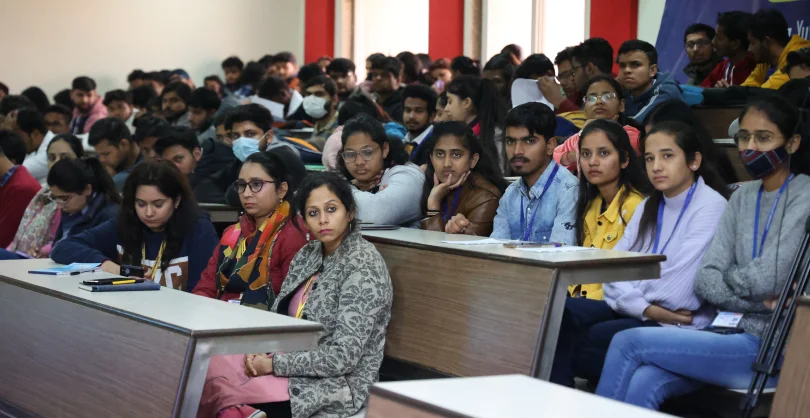OVERVIEW
The Bachelor of Education (B.Ed.) is a two-year undergraduate programme approved by the National Council for Teacher Education (NCTE) at KRMU, preparing students for a career in the field of teaching. The vision of the programme is to develop a profound understanding of the educational processes. Throughout the academic year, students get deeper insights into curriculum development, instructional methods, innovative teaching strategies, lesson planning, and engage in a variety of educational settings. At K.R. Mangalam University, we encourage future educators to meet the advancing needs of modern education.

Crafting the
Educators of Tomorrow
The curriculum of the Bachelor of Education (B.Ed.) programme is meticulously designed to provide an equal blend of theoretical concepts and practical expertise needed to succeed as professional educators. We place special emphasis on indulging students in a variety of workshops, seminars, guest lectures, and conferences to thoroughly understand the latest trends in the educational field.
Programme Structure
- Childhood Development and Diversity
- Educational Philosophy and Purpose
- Development of Education in India
- Language and Communication in Teaching and Learning
- Reflective Reading of Texts
- Self and Holistic Wellness
- School Immersion-I
- Knowledge Curriculum and Disciplines
- Science of Learning and Teaching
- Competency Based Assessment for Learning
- Environmental Education and Disaster Management
- ICT and EdTech in Teaching and Learning
- Art and Drama Integrated Pedagogy
- School Immersion-II
- Club/ Society
- Gender Education and Schooling
- Diversity and Inclusive Schooling
- Educational Research and Data Analysis
- Pedagogy of Teaching Subject-I
- Pedagogy of Teaching Subject-II
- Optional Course
- Career Readiness and Professional Practice
- Community Service
- Capstone Educational Research Project
- Internship in School Teaching-I
- Internship in School Teaching-II
Connecting Talent to Dream Careers
K.R. Mangalam University has collaborated with various top educational institutions like Kendriya Vidyalayas, Unacademy, Navy Children School, DAV Schools, Coaching Institutes, Chegg, and Sarvodaya Vidyalaya, Jawahar Navodaya Vidyalaya, K.R. Mangalam Schools, Private schools, Vedantu, etc., offering students a platform to secure good internships and placements. Moreover, these institutions also conduct training sessions in the university to provide our students with hands-on industry experience and insights.

Career Options
After completing a Bachelor of Education (B.Ed.) degree, graduates can explore promising career prospects in diverse fields. With the growing demand for skilled educators, we prepare our graduates to work as qualified teachers in primary, secondary, and senior secondary schools. Here are some of the best career paths graduates can consider after completing a B.Ed. programme:
Programme
Outcomes
Teaching Competencies:
Describe teaching-learning process in the classroom and various factors that influence and provide necessary competencies for organizing learning experiences, and select and use of appropriate assessment strategies for facilitating learning.
01
Effective Communication:
Practice communication skills through various linguistic activities and apply them for better classroom communication.
02
Critical Thinking:
Analyze curriculum, select appropriate teaching methods, approaches and strategies and implement them in teaching-learning.
03
Ethics:
Understand values, mortality, community service and responsibility towards society.
04
Life-long Learning:
Identify the challenging and overcoming gender inequalities in school, classroom, curricula, textbooks, social institutions, etc.
05
Sensitive towards Inclusion:
Create sensitivity about language diversity in the classroom and its role in the teaching-learning process.
06
Self Development and Community Attachment:
Engage student-teachers with self, child, community and school to establish close connections between different curricular areas.
07
Technology Skills:
Enable student-teachers to integrate and apply ICT in facilitating the teaching-learning process and in school management.
08
Professional Competencies:
Systematize experiences and strengthen student teachers' professional competencies.
09
General and Specific Needs & Problems:
Understand various level learners, their needs, interests, and peculiar problems and motivate them to learn.
10
Pedagogical Content Analysis:
Conduct pedagogical content analysis in subject areas and use it to facilitate classroom learning.
11
To prepare competent and effective teachers who have a strong foundation in their respective subjects and can use a variety of teaching strategies to engage and motivate students.
01
To develop in student-teachers an understanding of the principles of pedagogy and educational psychology, and how to apply them in classroom settings.
02
To equip student-teachers with the knowledge and skills needed to create a positive and inclusive learning environment, and to effectively manage classroom behaviour.
03
To instil in student-teachers a commitment to professional ethics and values, and to prepare them to be responsible and ethical educators.
04
To encourage student-teachers to engage in lifelong learning and professional development, and to prepare them to be reflective practitioners who can continuously improve their teaching practice.
05
To prepare student-teachers to use technology effectively in teaching and learning, and to be able to integrate technology into their classroom practices.
06
To foster in student-teachers an appreciation for diversity and multiculturalism, and to prepare them to be able to teach students from diverse backgrounds.
07
To prepare student-teachers to be effective collaborators and communicators who can work with colleagues, parents, and other stakeholders to promote student learning and development.
08
Classroom Management:
Enable to comprehend the development in physical, cognitive, social and emotional areas, contemporary issues and educational policies of the education system in India, teaching-learning methods, strategies, the epistemological basis of education, school management, professional ethics and observation of school activities by school internship.
01
Hands-on Experience:
Enable to understand the developmental task of different age groups, providing hands-on experiences to interact with children, developing understanding of individual differences among children in the class and organizing teaching-learning process accordingly, to comprehend teaching competencies and skills through various teaching pedagogies and internship and facilitating the learners to become a friendly user of ICT.
02
Research and Entrepreneurial Skills:
Enable to understand different research methods, conduct research work, prepare research papers and develop entrepreneurial skills.
03
Sponsored
MBA Degree
100% Sponsored MBA for Outstanding Undergraduates
KRMU takes pride in nurturing the leaders of tomorrow. To honor and encourage academic excellence, we offer a distinctive sponsorship scheme: Exceptional undergraduates have the opportunity to pursue an MBA at KRMU with 100% sponsorship. This initiative is our commitment to investing in the bright minds that have demonstrated remarkable academic achievements during their undergraduate studies.
Embark on an MBA journey without financial constraints and unlock your full potential. At KRMU, we provide more than just an education; we offer a pathway to excellence and success in the business world. Seize this opportunity to transform your academic prowess into a thriving career.
Frequently Asked Questions
Commence Your Journey
in 6 Simple Steps

Complete payment and submit
Pay the required Application Fee
Take an entrance test
K.R. Mangalam University Entrance Examination (KREE)
Appear for interaction
Attend our Faculty-Led Interview.
Get the admission offer
You will receive the offer letter after the successful interaction
Get Enroled
Be prepared to embark on your journey



















